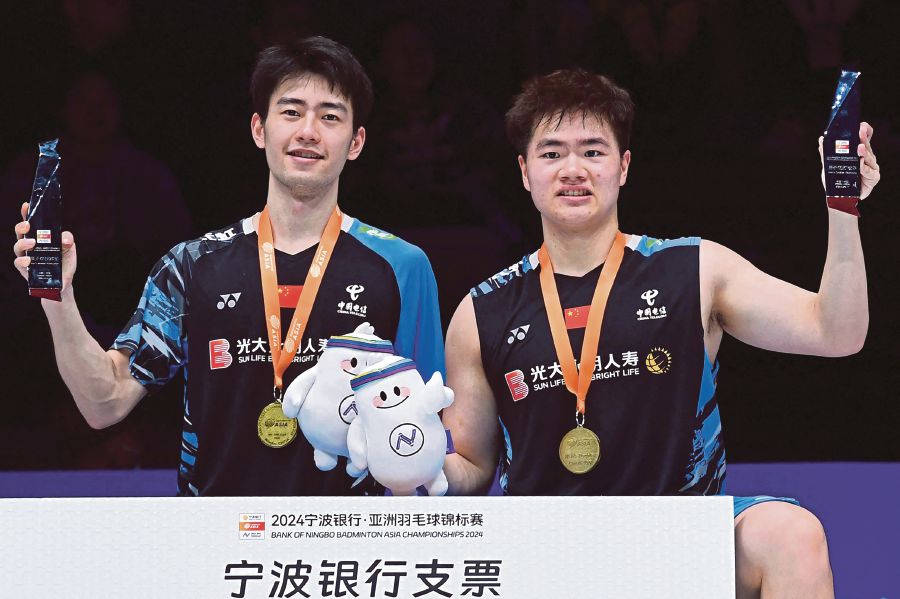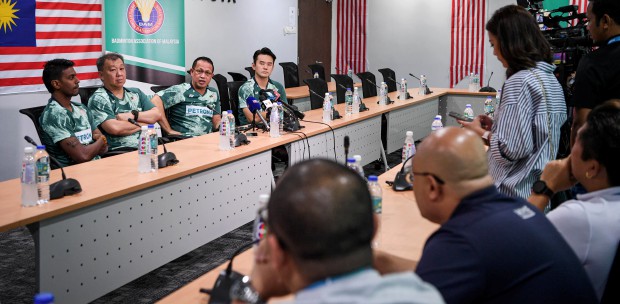KUALA LUMPUR: With their team's overall strength restored, expect China to settle for nothing less than regaining the Thomas Cup when they host the Finals in Chengdu from April 27- May 5.
After enduring one of their worst outings in the previous edition in Bangkok, where they could only reach the quarter-finals, China will enter the fray this time with a full-strength squad, looking more than capable of hoisting the trophy for the 11th time.
A lot has changed since their disastrous campaign in Bangkok, a time when the team could only field Lu Guang Zu, then world No. 25, and He Ji Ting-Tan Qiang, then world No. 18, for the first singles and first doubles roles.
A 3-2 defeat to Denmark saw China still making it through the knockout stage as group runners-up, but their weaknesses were exposed by a full-strength Indonesian side, the eventual runners-up, with a 3-0 whipping in the quarter-finals.
China were going through the post-Tokyo Olympics transition process at that time, and the China Badminton Association (CBA) decided to make a bold move by omitting 2016 Rio Olympic champion Chen Long, who had not returned to play competitively after finishing runner-up to Viktor Axelsen in Tokyo and eventually announced his retirement in May last year.
Perhaps the notable absentee was Shi Yu Qi, who was serving a 10-month internal ban by CBA for unsporting conduct.
China also no longer had the services of Li Jun Hui, who surprisingly called it quits at the age of 26 barely at the end of 2021, months after winning the Olympic silver with Liu Yu Chen.
Fast forward to the present, China are now back with a formidable line-up, with a rejuvenated Yu Qi, who fought his way back to a career-best world No. 2 ranking, returning to lead the challenge.
The team, announced by CBA on Tuesday, also see the return of Li Shi Feng, Guang Zu, and Weng Hong Yang from the previous squad, as established world's top 20 stars.
Shi Feng, who competed in the Bangkok edition as world No. 64, is now world No. 6, while Hong Yang (then No. 81) and Guang Zu have ascended to No. 16 and No. 19 respectively - showcasing just how far these players have come in the past two years.
The Chinese doubles department has also surged in recent years, boasting the luxury of selecting three pairs within the world's top 11 for the forthcoming Finals - Liang Wei Keng-Wang Chang (No. 1), Yu Chen-Ou Xuan Yi (No. 8), and Ji Ting-Ren Xiang Yu (No. 11).
China are expected to dominate Group A with relative ease, as familiar rivals, South Korea, lacking depth in men's singles, are not perceived as a threat. The other two teams, Canada and Australia, are considered minnows.
China's last Thomas Cup victory was in 2018 in Bangkok. They also claimed the title in 1982, 1986, 1988, 1990, 2004, 2006, 2008, 2010, and 2012.
Despite having home advantage, CBA president Zhang Jun emphasised caution, noting that the men's team competition has become more competitive than ever, with many teams showing significant improvement in recent years.
His assertion holds true to an extent, as China managed only one title from two finals entered between 2014 and 2022. This stands in stark contrast to the period when they won five successive titles between 2004 and 2012.
Zhang Jun told Badminton Magazine China: 'In the previous Thomas Cup, we did not have Shi Yuqi, and the retirement of Li Jun Hui resulted in temporary combinations in our men's doubles line-up.
"While our overall strength has seen improvement, so too have India, Indonesia, Taiwan, Malaysia, Japan, and South Korea.
"Our primary focus lies in how adeptly we navigate past each opponents, starting with a strategic approach to every match from the group stage onward."





